Mark Lindsay was the lead singer for Paul Revere & The Raiders, one of the most popular bands of the 1960’s. Their songs include “Kicks”, “Steppin’ Out”, “Hungry”, “Good Thing”, “Him or Me, What’s It Gonna Be”, and “Indian Reservation (The Lament of the Cherokee Reservation Indian)” which was a Number One hit in 1971. Their early songs, in particular, have a raw sound that was influential on punk rock a decade later.
Paul Revere & The Raiders appeared regularly on television, including being the house band for Dick Clark’s show Where The Action Is. They typically played in American Revolutionary War costumes, giving a visual gimmick to go along with their rockin’ music. It has been reported that Lindsay is the most televised American lead singer in history.
Lindsay also had success as a solo artist, with “Arizona” selling over one million copies.
This interview was for a preview article for the Happy Together Tour show at the Chumash Casino on 7/11/13, for which Lindsay is one of the featured performers. This was done by phone on 7/2/13.
Jeff Moehlis: What can we look forward to at your upcoming show?
Mark Lindsay: We started basically a little version of the Happy Together show in the ’80’s, but the last four years we’ve been out, the first year I think we had 14 dates, the second year we had about 25, last year was about 40, and this year we’ll do over 60 dates. So it’s building every time.
When I’m onstage I’m kind of like part of the audience and part of the show. I’m kind of like hovering above [laughs] the auditorium, watching everything. You get to watch the people. And for two and a half hours people get to forget that they might have mortgages, or kids in college with tuition fees coming up, or grandkids moving in with them, or whatever. Suddenly they’re back in the Sixties. They’re gonna change the world, and they have that music for two and a half hours and it just takes them back to a kinder, gentler time. Everybody has a great time. And it’s good for us. We get to get off on it giving it to them.
JM: It’s quite an interesting collection of artists for the show. Back in the day, did you have any notable interactions with the guys that you’re now touring with?
ML: Well, I don’t know what notable interactions might mean [laughs]. Back in those days it might’ve been offstage antics.
We’ve toured with all these guys, except I never toured with Chuck Negron before. And he’s awesome. Three Dog Night was such a powerhouse of iconic music in the Seventies. So he brings that to the table. You know, between all the different acts you have pop, you have power, it’s just a slice of the Sixties and Seventies in American music, and it’s wonderful.
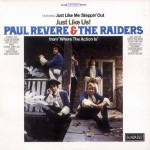
JM: I wanted to ask you a little bit about the music of Paul Revere & The Raiders. What was the songwriting process like for you?
ML: I started writing on my own, just about the time that we got signed to CBS Records. Terry Melcher was our producer, Doris Day’s son. He was the only guy at CBS under the age of 25 who was a producer, so they gave him The Raiders, because you know we were all kids, too. He found out that I wrote. And we started hanging out together, so he said, “Look, I just leased this house up on Cielo Drive. Do you want to share rent with me, and we’ll write songs and it’ll be easier to do it that way?” So we did. We got together, and had a great big piano in the living room. And we’d get together and start jamming. We’d come up with a phrase, or a hook, or whatever.
Terry didn’t have a lot of patience [laughs], he didn’t have a great deal of patience. We’d start something and I was always gung ho so I would stay and finish it, usually around the hook phrase or chorus or whatever, and build it from there. Then we’d go to the studio, we’d lay it down with the guys. And Terry and I would go in and do all the voices. We might change a few things at that point in time. Sometimes I actually rewrote entire verses and basically redid them at that point in time. So the writing was always in an ephemeral stage. It was never done until it was pressed out. Until that time it was always subject to change.
JM: You mentioned Terry Melcher. From the production side, what did he bring to the table?
ML: Well, he played a little piano and he sang those angel harmonies. He was actually the sixth Raider. His voice was that high harmony voice on all of the Raiders stuff that you can hear, that it wouldn’t sound right without his voice in it.
But what he brought to the table for the most part is he really knew the studio. He knew how to interact with the engineers. He knew what kind of sound he wanted, and even though he described it in non-technical terms, they understood what he meant. He got his point across. So I learned from him that the most important people to get to know in the recording studio was the engineers, the staff, and everybody there that was involved with the music. Not the musicians. You’re going to bring that yourself. You’re going to convey your ideas to the people that are going to put them down, and to do that, I learned how to say “can you attenuate that 2 dB on a medium Q at 45K” or something like that. And they knew what I was talking about. It worked well. If you learn the tools… and the tools in a studio are the staff as well as the studio itself and the machines. The people and the machines are important. You have to know both and utilize them correctly.
JM: There’s been growing interest recently in the group of studio musicians known now as The Wrecking Crew. Do what extent were they involved in Paul Revere & The Raiders’ records?
ML: They had a big part in the beginning. In the very beginning we went in, and we were already a rock and roll band with a good repertoire. We were basically almost an R&B band; most of our stuff was black material. You know, we were a good dance band. We went in and we cut stuff at CBS, but it wasn’t… We were a jam band, we were a dance band. We weren’t really a studio band.
So Terry, who was used to using studio musicians, I guess saw the potential in the band. We were actually just about where we’re going to be at Chumash, we were up towards San Luis Obispo, a little north. And Terry called me and said, “Look, I just cut a track. I want you to fly down and we’ll do it, and the rest of the guys can drive down later.” So I flew, and we did a track called “Sometimes”, which was cut with The Wrecking Crew.
This was good and bad. It was bad in that it enraged the rest of the band, because they weren’t used. But it was very good in that it galvanized them. Terry said, “Look guys, I can’t use you in the studio. You’re not good enough.” So they all started woodshedding, started practicing, and became good enough to be used on the following records.
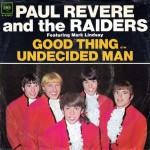
From that point on up to “Good Thing”, The Raiders were on all their own records. And then, after “Good Thing” we were doing Where The Action Is five days a week, we were touring. So between that there wasn’t a lot of time to record, so Terry and I would go in and record stuff with The Wrecking Crew after “Good Thing”. Because when the guys got off the road, most of them had wives or girlfriends or family. I didn’t and Terry didn’t. You know, we were sharing a house, and music was “our lives”. So when I got off the road I couldn’t wait to head for the studio, or start writing again. I didn’t care, I didn’t want a break. But everyone else did.
So because they wanted that break we had to bring in the guys, The Wrecking Crew, which as I’m sure most people who are going to be reading this know probably were responsible for 85% of the music that came out of Los Angeles and San Francisco from the early Sixties through the middle Seventies.
JM: Paul Revere & The Raiders have the “cool factor” of now being viewed as a proto-punk band. Especially the earlier recordings had that raw energy to them. Were you, or are you a fan of punk rock?
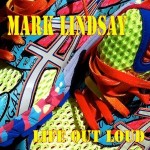
ML: Of course. Look, I just finished a CD called Life Out Loud. We did it just like the old days, old school, with two-inch tape, two microphones, two equalizers. The band’s playing live, I’m singing live in the vocal booth, which in this case happens to be the bathroom. And they’re all first take vocals. We didn’t go back and redo any vocals. I added some stuff. But it was so real.
When I heard it back off the tape machine, I said “We’re not mixing this. This is master. We’re putting stuff on top of this, but this is the way it goes down.” You can hear amps leaking, you can hear people talking in the background. There’s all kinds of crap on it. So real, so high energy, and so right now, that I left it just like it is. If you listen to that, that will let you know whether I like punk or not. Or that punky feeling, that grungy, just raw right-now in-your-face get-back-baby stuff.
[For a sample of the new album, visit here.]
JM: Of course, in addition to the music Paul Revere had a lot of TV appearances. One question about that, what was it like working with the late Dick Clark?

ML: He was very much a businessman. He was a music guy, but business really was his forte. He was more a businessman than maybe Clive Davis, or I want to say Bill Gates, but I think Bill had the edge there. For Dick, it was all about the bottom line. When he hired The Raiders for Where The Action Is, he hired us, one, because he needed a very lively, energetic band that would work cheap. And since we came from Idaho, we were these green kids from Idaho… He signed us up for thirteen weeks. He told me later, “My thought was, if the show took off I’d be able to hire a real band after that first thirteen week period.”
And luckily for us, that first thirteen week period was very much like a precursor to MTV. Anything that we’d release we’d premiere on the show. The whole country got to see it at once, on network television. And it was a wonderful vehicle for us, again, like a precursor to MTV. I guess I hold the record of being the most televised American lead singer in history, with over a thousand television appearances in Where The Action Is, the weekly shows, and Ed Sullivan, and all that stuff. So I still get recognized at the airport, although they don’t know what I did. They just say, “I know you from somewhere.” [both laugh]
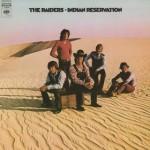
JM: Can you tell me the story behind choosing to record the song “Indian Reservation”?
ML: Sure. At that point Terry had moved on, and I was producing The Raiders. And I had just produced a song called “Birds of a Feather” for The Raiders’ new single. And “Arizona” had been a big Gold Record. And Jack Gold called me to his office and said, “I’ve got the next Mark Lindsay single for you.” I said, “What is it?” So he plays it, and I said, “Jack, I know this song. This song was out by Don Fardon about six months ago and fell off the charts.” And he said, “Yeah, but it’s Number One in England right now. And aren’t you part Native American?” I said, “Yes.” I one-eighth Cherokee. He said “Look, I think this would be a perfect Mark Lindsay song. I think you can sell this.” So I said, “Well, OK. I don’t know why I’m cutting this. It didn’t work the first time with Don. But let’s try it.”
So he calls me back the day, and – Jerry Fuller was my producer at that time – said, “Jerry’s in the middle of a project, so I want you cut it.” I said, “Jack, I can produce The Raiders, but to produce myself… it’s hard to be objective about that.” He said, “You gotta do it, you gotta do it.”
So I went in, and cut the song, got a great chart out of Artie Butler who wrote the rhythm arrangement, and a great string arrangement. When I was through, I was totally ambivalent. Most of the times in the studio when I finished a project I could call the chart number. I could say, OK, this is going to be between 10 and 20, or between 5 and 15. I could name the chart positions within 5 or 7 either way, pretty close. With “Indian Reservation”, I thought this is either the biggest hit The Raiders or I ever had, or the biggest stiff that’s ever going to be out there. And I didn’t know what to do, so I was vacillating.
Finally, Jack Gold says “We’ve got to put this out. We need this out.” And I said, “Don’t we need a Raiders record?” He said, “Yeah”, and I said “Let’s put it out under the name of The Raiders instead of Mark Lindsay” [laughs]. Kind of hedging my bets. Of course The Raiders weren’t on the session at all. So we put it out under the name of The Raiders, and of course it was the biggest selling single in the history of CBS records, and the biggest selling single they never played on. It was supposed to be a Mark Lindsay single. But it doesn’t matter whose single it was. I think it’s a great song. It was a great statement. At the time Bury My Heart at Wounded Knee was Number One on the Times Bestseller List, so it was a very timely record. That’s why it sold so well.
JM: I read that after you left Paul Revere and The Raiders one of your jobs was writing and singing jingles for commercials. Are there any of those that we might remember?
ML: Oh gee, I don’t know. I did a commercial for Yamaha. [Sings “Yamaha, won’t you fly me away”.] I did stuff for American Airlines, did things for Western Airlines, did things for Levi’s. Did a lot of stuff. But they come and they go. Commercials are meant to be listened to for a while and then shoved back in the rack and moved on.
JM: So there’s no compilation CD coming out?
ML: [laughs] No. None of my greatest commercial hits.
JM: What advice would you give to an aspiring musician?
ML: The first thing I would do is say to get some good legal advice before you do anything. Everybody that’s a musician wants to play so bad. I remember my first record deal, there were five members of the band and we were splitting a nickel a record. That was a penny apiece. I would’ve given them a nickel of my money to make that record. We wanted to do it so badly. But you get into contracts that are so unfair, one-sided, that you’ll never make your money back. So get some legal advice, and do your homework.
And realize that if you get lucky enough to get a hit record that’s wonderful, but have another career to fall back on. It’s a fine line. You have to dedicate every ounce of your energy to make it happen, but yet you have to hold something back in case it doesn’t.
I don’t know where that line was drawn. With me it never was. I was always all-the-way. So maybe I’m not the greatest guy to give advice.
JM: You mentioned the album Life Out Loud. Is that due for release sometime soon?
ML: It’s just come out. Little Steven Van Zandt is on it like crazy on Sirius Radio. He’s playing the first single in rotation like six, eight times a day. We’re due for the second single, and there’s going to be a big album release party, officially on Halloween, but it’s going to be out there in front of that. Go to bongoboyrecords.com and you’ll find out all the information.
JM: Do you want to set the record straight on anything related to your career, or Paul Revere & The Raiders?
ML: Actually I would. And I’m working on a book. I’ve written it, like, three times. Everytime I write it I get to the end and I look at it after a few months and go, “No, no, no. That’s being way too easy on myself”, you know? So I go back and rewrite it. Now I’m getting closer to the truth. This time it may be the one that happens. In the book, I will be able to tell everything that I ever wanted to say, and some people are going to like it and some people aren’t. That’s the way it goes. If you tell the truth you can’t please everybody, that’s for sure.
JM: Do you have a target for when the book will come out?
ML: No, I hoping maybe next summer. I’m still fine-tuning it.
JM: Where are you speaking to me from?
ML: We’re actually in New Jersey, at a wildlife preserve. My wife and I are full-time RV’ers, and we move about every two weeks. Have been for about the last two years, and it’s a wonderful lifestyle. I’ve written more songs in the last two years than I had in the previous twenty. Obviously it works for me. I walk about six miles, ten miles a day, and write in my head. I feel like I’m eighteen again, and I’m rockin’.

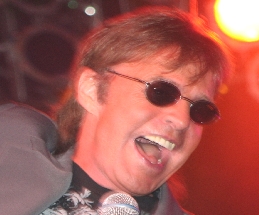
Great interview. I grew up in the Pacific Northwest at the time of Paul Revere & the Raiders, the Kingsmen, Don & the Goodtimes and smaller bands that rocked at all our favorite bandstands. PR&R were my favorite though. Drake was from my hometown of Corvallis, OR and we would see the group on an very regular basis, until “Where The Action Is” put them on TV. Great interview with a great singer/songwriter!
I have not read this interview before. It is absolutely wonderful! I have been in fan of Mark’s since the 60’s and over the years have had a chance to meet him and his wife, Deb. They are very genuine people and so friendly. Mark is super talented and I have his new cd “Life Out Loud” and highly recommend it for anyone! Keep on Rockin’ Mark!!!!
the link to hear the Yamaha commercial my Mark Lindsay is down. I Would Love To Hear It. Is there another link? Thanks.